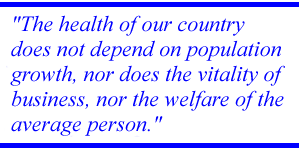NPG Forum Series
Nixon and American Population Policy:
he post-mortems marking the 25th anniversary of Watergate earlier in 1997 overshadowed another quarter-century milestone of the Richard Nixon era – one of even greater long-term consequence for the nation's future.
In 1972 President Nixon rejected the report of John
Rockefeller's Commission on Population and the American Future
– the nation's sole consideration of an explicit population
policy. While the idea of a national commission took form under
Lyndon Johnson, President Nixon made population growth a major
concern, calling it in 1969 "one of the most serious challenges
to human destiny in the last third of this century." He
backed legislation creating the commission and appointed most
of its members. Senator Daniel Patrick Moynihan, then a
Nixon White House advisor, was a driving force.
There was good reason then for Nixon's sense of urgency. The
post-war baby boom had added fifty million Americans in just
two decades. If that high birth rate had persisted there
would have been 400 million Americans by 2013.
In its two years of study, the Rockefeller Commission produced
recommendations that were bold, visionary and often counter-cultural.
With the United States then at about 206 million, the Commission
called for an early end to further population growth, appealing
to Americans to abandon their "ideological addiction to
growth" and the outdated pronatalist biases rooted in their
social institutions. For the Commission, the critical corrective
was for American couples to move from the prevailing three-child
family to no more than two children.
 Even business representatives
on the Commission supported the central, near heretical finding:
"the health of our country does not depend on population
growth, nor does the vitality of business, nor the welfare of
the average person."
Even business representatives
on the Commission supported the central, near heretical finding:
"the health of our country does not depend on population
growth, nor does the vitality of business, nor the welfare of
the average person."
The recommendation boldly confronted explosive issues:
- Abortion – decriminalize it;
- Contraceptives – remove the remaining legal bars to their availability;
- Sex education – make it available to all through schools and community institutions;
- Immigration – freeze legal immigration at 400,000 a year and stop illegal immigration;
- Equal Rights Amendment – support it and other efforts to ban all discrimination based on sex.
The Commission rejected charges that it would have the government tell citizens how many children they could have. Its proclaimed goal was freedom of choice under which... "it would be equally honorable to marry or not, to be childless or not, to have one child or two, or more. Our goal is less regimentation of reproductive behavior, not more."
Faced with splenetic opposition from major churches and conservative groups, and aware that America's fertility was finally dropping, the once enthusiastic Nixon rejected the report. He stressed that abortion was an unacceptable means of birth control and that contraceptives for youth would weaken families.
 Rockefeller's report was shelved, but
the issues it dealt with were not. A year later Roe
v. Wade decriminalized abortion. Most state governments
dismantled the remains of the Comstock laws restricting contraceptives,
and expanded sex education. Fertility fell below replacement:
the American public in the last quarter century has opted for
the two-child family favored by the Commission.
Rockefeller's report was shelved, but
the issues it dealt with were not. A year later Roe
v. Wade decriminalized abortion. Most state governments
dismantled the remains of the Comstock laws restricting contraceptives,
and expanded sex education. Fertility fell below replacement:
the American public in the last quarter century has opted for
the two-child family favored by the Commission.
Even so, the nation's population future remains troubling. Mass immigration, now three times the 400,000 annual limit the Commission wanted, accounts for almost 40 percent of current population growth, negating the population savings from lowered domestic fertility. And pro-natalist biases persist in our laws and official attitudes.
The United States has added 60 million people since the Commission spoke. The Census Bureau conservatively projects 125 million more in the next 55 years. Since the Commission convened in 1970, nearly 90% of that growth will be attributable to immigrants settling in the United States and their descendants. In the last quarter century the Rockefeller Commission's spurned goal of a stationary American population has become a receding prospect.
| About the author David Simcox chairman of the Center for Immigration Studies, a Washington-based think tank and also serves as Senior Advisor at NPG. |
